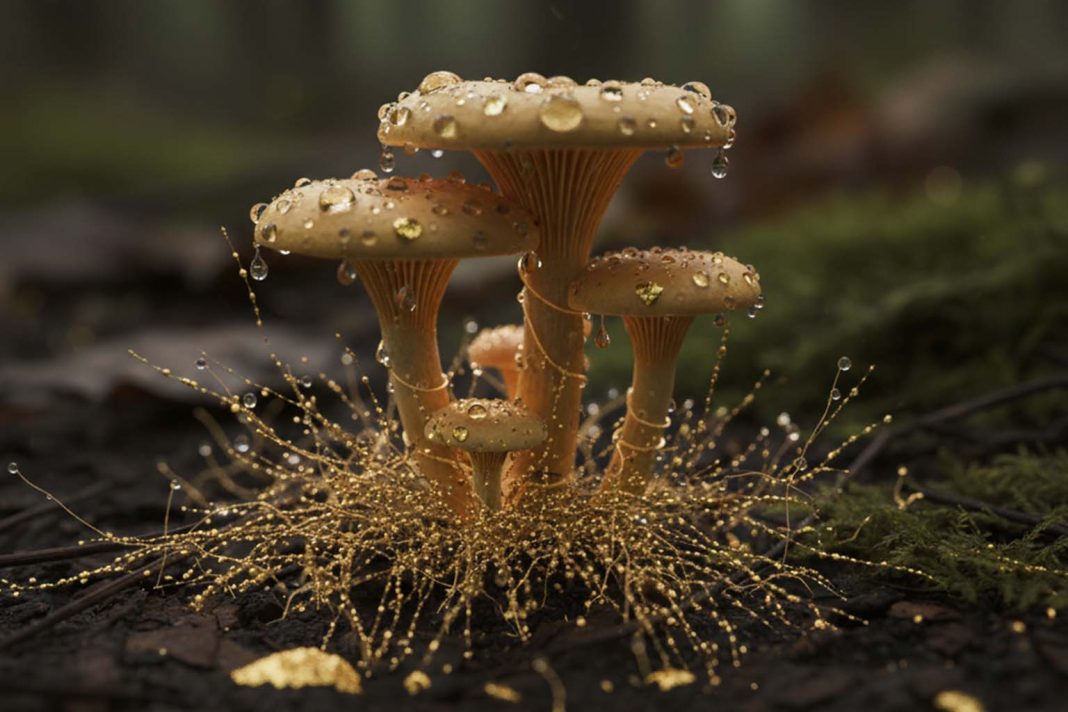Gold, an element synonymous with wealth and wonder, has captivated human civilization for millennia. Its scarcity on Earth has driven expeditions and innovations, shaping economies and cultures. But what if the key to unlocking vast reserves of this precious metal, not just on our planet but across the cosmos, lay within an unassuming microorganism? In 2019, scientists made a discovery that sent ripples through the scientific community: a fungus capable of metabolizing gold. This revelation prompts a fascinating question, especially for nations like India with burgeoning space ambitions: could this microscopic gold alchemist pave the way for future space mining?
The Terrestrial Discovery: A Fungus’s Golden Touch
The groundbreaking 2019 discovery by researchers from CSIRO and the University of Adelaide identified the common soil fungus, Fusarium oxysporum, as possessing an extraordinary ability. This fungus actively contributes to gold particle formation through bio-mineralization: dissolving gold ions and reducing them into solid, microscopic gold nuggets on its surface.
Crucially, this isn’t about the fungus creating gold, but concentrating existing dissolved gold. Scientists observed the fungus employs a detoxification mechanism, precipitating toxic gold ions as inert metallic gold. This biological process has profound implications for terrestrial mining, particularly in extracting gold from low-grade ores or in bio-remediation. It offers a potentially environmentally friendlier, less energy-intensive alternative. For India, seeking sustainable resource extraction, understanding this natural phenomenon holds immediate value.
India’s Cosmic Aspirations and the Asteroid Riches
India’s space exploration has marked significant milestones, from Mangalyaan and Chandrayaan to the ambitious Gaganyaan human spaceflight program. As a rapidly developing nation, India’s demand for resources—including rare earth elements, platinum group metals, and gold—is projected to grow exponentially. This increasing terrestrial demand, coupled with dwindling high-quality reserves, naturally pushes the gaze towards space.
Asteroids are believed to hold vast amounts of valuable commodities. The concept of asteroid mining, once science fiction, is becoming a serious area of research for spacefaring nations. However, immense technical and logistical challenges for extraction and return remain formidable. This is where novel solutions, potentially involving bio-technologies like Fusarium oxysporum, enter the picture.
“Harnessing biological agents for resource extraction in space is a paradigm shift,” states Dr. Ramesh Kumar, a former ISRO scientist specializing in exogeology. “While challenges are immense, from radiation shielding to nutrient delivery in microgravity, the sheer efficiency and self-replicating nature of microorganisms offer a tantalizing prospect for in-situ resource utilization beyond Earth.”
Fungus in Orbit: Unlocking Space Mining’s Future?
The notion of sending Fusarium oxysporum into space for gold extraction presents exciting possibilities and significant hurdles. In the harsh environment of space, traditional heavy machinery faces extreme wear, requires immense energy, and intricate maintenance. A self-replicating, adaptable biological agent could potentially offer a more sustainable, cost-effective approach for in-situ resource utilization (ISRU) on asteroids or other celestial bodies.
Imagine small, autonomous bio-mining units. Deployed to an asteroid, they could metabolize trace dissolved gold within the regolith, concentrating it into manageable particles. This significantly reduces the need for large-scale, energy-intensive drilling. The resilience of F. oxysporum – known to survive in diverse terrestrial environments – also makes it a compelling candidate for astrobiological applications.
However, challenges are formidable. Fungi would contend with radiation, extreme temperature fluctuations, vacuum, and microgravity’s unique effects. Developing enclosed life-support systems and optimizing their gold-extraction efficiency under extraterrestrial conditions requires extensive research and engineering. Furthermore, strict planetary protection protocols must be adhered to, ensuring no terrestrial contamination.
The discovery of Fusarium oxysporum‘s ability to metabolize gold is a testament to nature’s ingenious solutions and the boundless potential of biotechnology. While still in its nascent stages, the idea of utilizing such microorganisms for space mining opens a fascinating chapter in humanity’s quest for extraterrestrial resources. For India, a nation rapidly advancing in space exploration and increasingly aware of its resource needs, investing in bio-mining research offers a forward-looking strategy. The path from a terrestrial fungus to a cosmic gold miner is long and fraught with scientific and engineering challenges. Yet, the possibility that a tiny organism could one day help unlock the universe’s vast wealth, fueling humanity’s expansion beyond Earth, is a prospect that shines brighter than any gold nugget.




